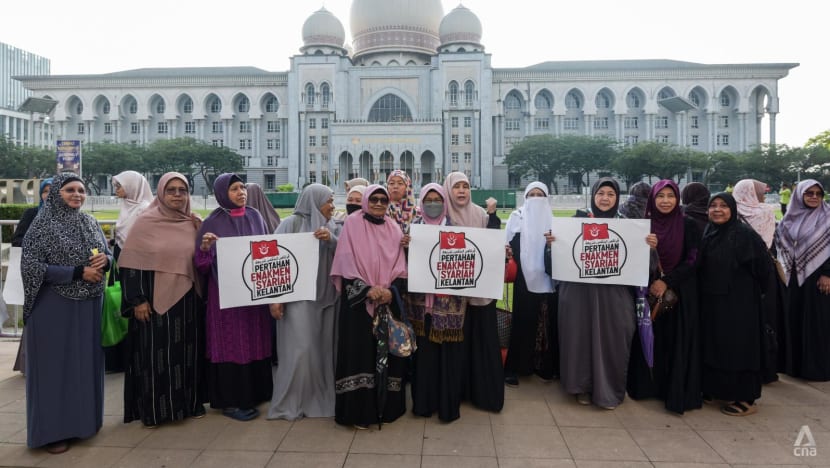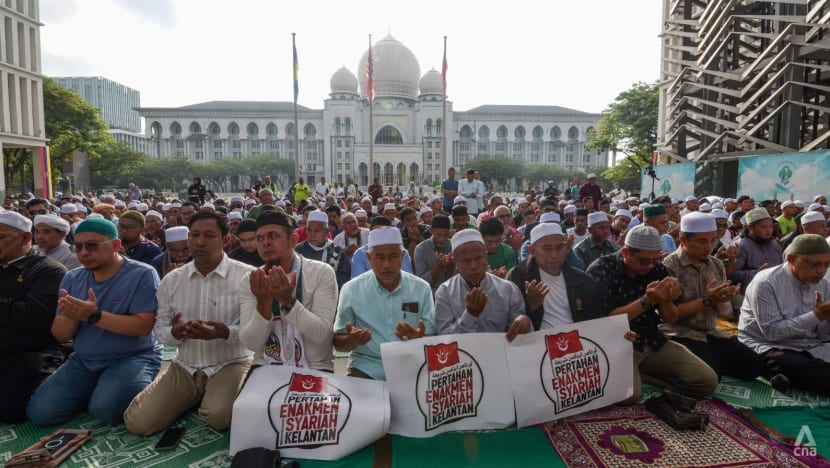Malaysian government, opposition seeking to contain fallout from court ruling against Kelantan's Syariah laws
A nine-member Federal Court bench, in an 8-1 decision, declared 16 laws in Kelantan's Syariah criminal code "void and invalid", including provisions criminalising sodomy, incest, gambling, sexual harassment, and desecrating places of worship.

Protesters gather outside the Palace of Justice in Putrajaya holding signs displaying “Defend Kelantan Syariah Enactment” on Feb 9, 2024. Earlier, PAS secretary-general Takiyuddin Hassan called on Malaysians to show their solidarity with the Kelantan state government by turning up at court in Putrajaya. (Photo: CNA/Fadza Ishak)

This audio is generated by an AI tool.
KUALA LUMPUR: Political leaders from the ruling and opposition camps have sought to contain the fallout of a controversial court decision on Friday (Feb 9) against the use of 16 Islamic legislations in the Kelantan state, with analysts warning against politicisation of the issue based on groundless claims.
Prime Minister Anwar Ibrahim said the ruling had nothing to do with the federal government undermining the powers and position of the Syariah laws in the country, while the opposition Perikatan Nasional (PN) claimed that the decision hurt the feelings of Muslims in the country and could erode the power of the country’s royalty.
Malaysia has a dual-track legal system with Islamic criminal and family laws applicable to Muslims running alongside secular laws. Islamic laws are enacted by state legislatures while secular laws are passed by Malaysia's parliament.
A nine-member Federal Court bench, in an 8-1 decision, declared 16 laws in Kelantan's Syariah criminal code "void and invalid", including provisions criminalising sodomy, incest, gambling, sexual harassment, and desecrating places of worship.
Chief Justice Tengku Maimun Tuan Mat who delivered the majority judgement said that the Kelantan state had no power to enact the laws, as the subject matter was covered under parliament's law-making powers.
She also stressed that the issue of civil courts not defending Islam or of not strengthening the Syariah Courts did not arise.
Political analyst Dr Awang Azman Awang Pawi of Universiti Malaya (UM) told CNA that PN might however use the issue for political mileage, albeit on groundless claims.
“If they use the issue, it will show their ignorance about the constitution,” he said.
About 1,000 demonstrators - many supporters of the opposition - had gathered outside the court to hear the decision.
Almost two-thirds of the Malaysian population are Muslim.

ANWAR: RULING PLAYED UP TO DISCREDIT GOVERNMENT
Mr Anwar on Friday said that the Federal Court's ruling was purely about determining and distinguishing the powers of the federal government and the state government.
He said the issue was being played up by the opposition to discredit the federal government.
"They are using the issue to create a sentiment among the Muslims in the country that the federal administration under Anwar's leadership is against the Syariah.
"Don't they know that the matter is purely about the powers between the state and federal governments?" he was quoted as saying by the News Straits Times at an event.
He also said that the constitutional challenge was initiated at the Federal Court and not in the cabinet or against the prime minister.
"Having said that, what did PN do when the constitutional challenge was initiated? Why did they not challenge it back then when they were in power? Only now they are speaking about it, trying to politicise the issue," he said.
Minister in the Prime Minister’s Department (Religious Affairs) Dr Mohd Na’im Mokhtar said in a statement on Friday that the decision did not affect the position of the Syariah Courts as it remains strong as guaranteed in the constitution.
He said that if there was a need for amendment or reform of the law related to the Syariah Court, it would be done immediately.
He added that all stakeholders and parties involved with the Court will be promptly convened to discuss and assess the next steps for its empowerment.
Malaysian opposition leader Hamzah Zainudin, who’s PN’s secretary-general, said that the decision hurt the feelings of Muslims in the country especially as Islam was the official religion as stated in the constitution.
In a statement he said the development showed a serious weakness in the majority’s right to practice and profess their religion.
He also claimed that the decision would challenge the Syariah criminal enactment in all states, exposing them to the risk of annulment.
"If viewed from the naked eye, this decision could significantly erode the powers and jurisdictions of the Malay Rulers,” he said, adding that he had requested for audiences with the Malaysian King as well as the ruler of the Selangor state.
He also hoped that all parties that had an interest in the matter, regardless of their political affiliation, would work together on the issue.
Earlier on at the court, Islamist party Parti Islam Se-Malaysia (PAS) secretary-general Takiyuddin Hassan, whose party is part of the PN coalition, claimed that it was a “Black Friday” for the Syariah Court and that the judgement could affect Syariah laws in other states.
"When one law is nullified in one state, it means that the Syariah laws in other states are also in a dangerous and critical situation," he said.
The petition to the Federal Court was filed by Kelantanese lawyer Nik Elin Zurina Nik Abdul Rashid and her daughter Tengku Yasmin Nastasha Tengku Abdul Rahman.
They had filed a constitutional challenge against 18 provisions under the state’s syariah criminal enactment.
The Court ruled that two of the provisions were constitutional and valid as the subject matter in the provision were within the state list.
PN EXPECTED TO PLAY UP ISSUE
Political scientist Dr Syaza Syukri of the International Islamic University Malaysia (IIUM) told CNA that PN would definitely use the decision to their advantage.
Besides PAS, PN also comprises Parti Pribumi Bersatu Malaysia (Bersatu), and Parti Gerakan Rakyat Malaysia (Gerakan).
“When it was still being heard in court, they were already claiming Islam is under threat. I’m sure they will use this opportunity to paint the court and the government itself as being on the liberal side and demoting Syariah courts, if not fully claiming the Syariah court itself is demolished,” she said.
She said that a big majority of Malays are already on PN’s side and the court decision would only “confirm” their commitment and loyalty to the coalition.
“So it would really be status quo unless Anwar can do something in the next three years to win over the Malays,” she said.
She believed that the government needed to effectively explain the decision in layman's terms.
“They don’t need to try so hard to win over the Malays as most of them are set on PN already. So Anwar should focus on enlarging the middle ground with effective communication,” she said.
Dr Awang Azwan of UM pointed out that the chief judge was from Kelantan while the lawyer and her daughter who filed the case were also from the state.
“The chief judge was not appointed by Anwar. If she was, the opposition could use it as an excuse (to vilify Anwar),” he said.
He added that it was clear that the laws enacted were beyond the power of the state.
“The law practitioners in PN would deny they are in the wrong. They did it for their own political mileage,” he said.

LAWYERS: COURT REITERATED ESTABLISHED LEGAL POSITION
Lawyer Joshua Wu, a partner at Messrs. P.E. LIM, told CNA that the Federal Court reiterated the established legal position - namely that there are certain matters within parliament's legislative jurisdiction and therefore state assemblies could not legislate on those matters.
He said that even before this case, there were already legal challenges to state enactments, citing a challenge to a Selangor state law's provision that made “unnatural sex” a Syariah offence.
The Federal Court in 2022 ruled that the provision was void as it was unconstitutional.
“It is arguable whether Nik Elin's case would be a game changer in terms of legal challenges against State Syariah criminal offences,” he said.
There are altogether 68 sections in the Kelantan Syariah criminal code, out of which 52 sections are still considered to be constitutional.
“The remaining provisions of the Enactment were not the subject of the legal challenge and so they remain enforceable. As a general rule, the presumption of constitutionality applies. So legal provisions are presumed to be constitutional until and unless ruled otherwise by the Court,” he said.
Lawyer Charles Hector said the court case determined whether the state can enact laws that are clearly under the jurisdiction of the Federal government.
“The Constitution lists what comes under the Federal Government powers, and what comes under the state government powers. Criminal offences generally come under the Federal Government's jurisdiction,” he wrote in a blog posting.
“To have two different criminal laws that criminalizes actions and provide for different sentences causes not just confusion but injustice. Which law should the suspected criminal be charged with - the Federal law or the State law? This is the issue,” he added.



















